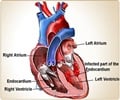Researchers at Emory University School of Medicine created the Health ABC Heart Failure Model for predicting risk of new onset heart failure in the elderly.
Researchers at Emory University School of Medicine created the Health ABC Heart Failure Model for predicting risk of new onset heart failure in the elderly. Now that model has been strengthened by validating it in a separate library of patient data from an earlier cardiovascular study.
The results suggest the Health ABC risk model can be used to identify high-risk individuals for whom interventions can be targeted cost-effectively to prevent heart failure."This is a scoring system that could help individuals or their physicians understand their five-year risk for heart failure, using basic risk factors that are easily obtained at relatively low cost," says Javed Butler, MD, MPH, associate professor of medicine and director of heart failure research at Emory University School of Medicine.
Andreas Kalogeropoulos, MD, a post-doctoral research fellow with Butler, presents the findings Monday at the American College of Cardiology conference in Orlando.
Heart failure is the leading cause of hospitalization in people older than 65 and greatly increases the risk of sudden cardiac arrest.
The Health ABC model uses nine clinical measures to estimate the risk of heart failure in patients who haven't necessarily been seen by doctors for coronary heart disease before. The nine measures are: age, history of coronary heart disease, smoking, blood pressure, heart rate, left ventricular hypertrophy measured by electrocardiography, and blood levels of glucose, creatinine and albumin.
Several individual risk factors for heart failure have been identified, but Butler says the model is the first that combines the risk factors into a system for predicting risk for any given individual. The model categorizes individuals into four risk categories ranging from less than 5 (low) to more than 20 percent (very high) 5-year risk, and has been shown to perform well for men, women, Caucasians and African Americans.
Advertisement
The Health ABC model grew out of the Health Aging and Body Composition Study, which followed 2,935 elderly people in the Pittsburgh and Memphis areas over seven years starting in 1998. The model was validated by assessing it in 5,335 people without pre-existing heart failure from North Carolina, California, Maryland and Pennsylvania who were participants in the Cardiovascular Health Study beginning in 1989.
Advertisement
Source-Eurekalert
SRM















